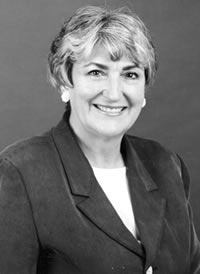
Julia Taft, former U.S. Assistant Secretary of State and Special Coordinator for Tibetan Issues.
Julia Taft; Crisis Manager Helped Resettle Refugees
By Yvonne Shinhoster Lamb
Washington Post Staff Writer
Wednesday, March 19, 2008
Julia Vadala Taft, 65, a former assistant secretary of state who was recognized as a top crisis manager through her work with refugee protection and disaster relief efforts around the world, died March 15 at her home in Washington. She had colon cancer.
Mrs. Taft coordinated major refugee resettlements in the United States and abroad beginning in the mid-1970s and worked on humanitarian relief in countries ravaged by war and such natural calamities as floods, famine and earthquakes. She dealt with dislocations in Bosnia, Kosovo, Armenia, Afghanistan, Iraq, Liberia and Sudan.
A tall woman with a commanding presence and down-to-earth persona, Mrs. Taft was known for her ability to organize large-scale resettlement efforts. She understood how to set up camps and deal with tragedy, said Ken Bacon, president of Refugees International, who also worked with Mrs. Taft in the Clinton administration. “It was her ability to bring order to chaos — plus her willingness to get on a plane, helicopter, jeep or riverboat to go almost anywhere that enabled her to make a difference,” Bacon wrote in a blog on his agency’s Web site. “Whether in the White House, a refugee camp, or a meeting with government and [nongovernmental organization] officials, she knew how to get people moving.”
In 1975, Mrs. Taft was chosen by President Gerald R. Ford to coordinate the evacuation and resettlement of 131,000 refugees from Vietnam, Cambodia and Laos who risked persecution at the end of the Vietnam War.
“We rescued these people in the face of fierce political opposition,” she said in an op-ed article last year in The Washington Post. In the article, she questioned President Bush’s lack of “urgency for the 4.2 million Iraqis displaced and in danger” because of the Iraq war.
From 1975 to 2004, Mrs. Taft designed and developed refugee programs for the State Department, Department of Health and Human Services, Agency for International Development and United Nations.
Along the way, she faced danger but managed to regale friends with stories of her adventures. In 1987, she left for the Armenian earthquake zone so fast that the only personal gear she could find was her daughter’s pink Strawberry Shortcake sleeping bag, her son said.
On a relief mission in Sarajevo in 1992, she climbed into a bathtub with a helmet and bulletproof vest when her hotel came under fire.
Her work as head of U.S. disaster relief for victims of the Armenian earthquake earned her the Soviet Union’s Supreme Soviet Award for Personal Courage and a Distinguished Service Award from the Agency for International Development in 1989.
From 1994 to 1997, she was president of InterAction, the U.S. council for voluntary international action, which involves more than 150 U.S.-based nongovernmental organizations that work on international relief and development. In 2006, she returned to InterAction as interim president to help it through a difficult transition.
Last year, she received its Outstanding Leadership Award.
In 1997, President Bill Clinton appointed her assistant secretary of state for population, refugees and migration, a post she held for four years. In 1999, she was named to the additional post of special coordinator for Tibetan issues to promote dialogue between the Dalai Lama and the Chinese government.
From 2001 to 2004, Mrs. Taft served as assistant administrator and director in the U.N. bureau for crisis prevention and recovery. In 2002, she headed the U.N. task force for recovery efforts in Afghanistan.
She was born July 27, 1942, in New York, the daughter of Army surgeon Antony Vadala. She graduated from the University of Colorado and received a master’s degree in political science in 1968.
Her marriage to Fred Malone ended in divorce.
In addition to her husband, William H. Taft IV, former deputy defense secretary and State Department legal adviser, survivors include three children from her second marriage, Maria Consetta Taft of Woodside, Calif., Julia Harris Taft of San Francisco and William Howard Taft V of New York.

